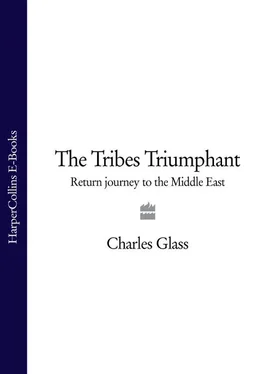Usama had become a calligrapher, not in the traditional Arabic fashion of ink on parchment, but in three dimensions. He took me to his workshop, a small room off the corridor. Here I saw the tools – arrayed in neat rows on the wall – with which he chiselled, scraped and sculpted Arabic letters into vibrant shapes in wood, iron and brass. A simple word like hua , he, looked like the statue of a man, its contours unconfined to the flat page. The most beautiful, as in traditional Arabic calligraphy, was Allah , God, whose image can never be painted or carved by a good Muslim, any more than a devout Jew can speak his name.
‘At about the age of forty,’ Usama said, ‘I decided that Arabs don’t know how to retire.’ Arab presidents and kings fitted the general pattern. ‘I went to Iraq al-Amir, where there is an old, eighth-century palace or fort. The Jordanians have crafts industries there. I went down to teach them how to make paper.’ He gave me some dark paper, thin but sturdy and as absorbent as an egg box.
I felt the paper and looked at Arabic words come to life. Why was Usama Khalidy content to leave the medical school to the next generation of instructors and to allow his daughters to choose their husbands and not to tyrannize his family or those exiled Jerusalem Muslims who might look to a Khalidy for leadership? What made tribal chiefs, family patriarchs, kings, policemen and dictators cling to power until death? What drove out or suppressed the most interesting, the most creative and the most original within the Arab family? Why did the Arab world fight against its best self?
Did Usama, who felt these questions in a more profound way than a visitor like myself, despair? He thought for a few seconds and said, ‘No.’ Why not? ‘We’re passing through a funny phase. At the same time, one has to remark that the Arabs are probably the world’s oldest living tradition. A child can read something written in Arabic fifteen hundred years ago and enjoy it. You cannot do that in English, for example. A child today cannot understand Chaucer and would have problems with Shakespeare. Our tradition is there. It has survived. It will survive. It’s getting much poorer, of course.’
Usama, amid his bottles of desert scent, his bold script statues, his library, his relics of old Jerusalem and his ancestral pictures, did not mention the West. He did not blame Britain and France for drawing lines all over the map that erased the harmony of the Jund and brought European Jews to displace him and put compliant dictators in charge of the oil that could, perhaps should, have propelled Arab civilization into the vanguard of intellectual and artistic discovery. The dictators kept the Arabs in servitude and, for the most part, misery. For this failure of leadership and of society, his gaze turned – not in anger at the United Nations or Great Britain or the United States – but in regret at the tribes.
‘Our main problem is education.’ He said that Arab education prepared the young only for examinations, the tawjihi. Pass the tawjihi , and you continue to university. Fail, and you stay in the village or the slum. The tawjihi system produced students who memorized set answers to set questions, not those who thought or questioned or looked at things in an original way. ‘Reforming the education system will help, but it needs a revolution. We take the best students. They have to study medicine or engineering. The worst go on to schools of education. Worse than that, they go to schools of theology. The worst are in charge of our brains, the best in charge of our muscles.’
In the 1930s and 1940s the Palestinians were led by the obstinate and self-destructive Haj Amin Husseini. Then came Yasser Arafat. Neither was known for intellect or wisdom. Had the leaders improved in half a century? ‘Not very much. The Palestinians deserve better leadership. The whole Arab world deserves better.’
Before I left him to the study of plants and the manufacture of words, I asked him about identity. Was he an Arab, a Palestinian, a Jordanian, a Muslim? The concoction of tribalism, faith and nationalism bedevilled Israelis and Palestinians alike. Who is a Jew? What is an Arab? Juwal Levy’s father had gone to court to take the word Jew off his identity card. Some Arabs believed in the Arab nation, divided into states that could never be nations. Some were Lebanese or Egyptians first, Arabs second or not at all.
‘Arabs don’t know the word huwiya ,’ he said. Huwiya meant identity, and it was also the identity card that policemen in Israel and the Arab world demanded from Arabs. ‘It’s a very new word. We don’t think of identity. We think of loyalties. Unlike identity, which is exclusive, loyalties are multiple. You can be loyal to your family, your religion, your state and so on. It depends on the situation. If my child is sick, that is my first loyalty.’
When loyalties conflict, does identity dissolve?
‘You noticed after 1948, as the Arabs lost faith in Arabism, they ended up going to religion – either the religion of communism or real religion. It happened after ’48. It’s happening now.’ With communism dead, Islam remained.
Allegiance, loyalty, identity. Race, sect, tribe. The Zionists came to the right address. Every question the Zionists asked had its equivalent among the natives. Who is a Jew, a question debated in Israel’s civil and religious courts, translated as, who is an Arab? Was it blood or language or geography? There was no Platonic ideal of Arab or Jew, and everyone refined his identity: Ashkenazi or Sephardi Jew, Arab of the Mashrak, the East, or the Maghreb, the West in North Africa. There were Arabs in Syria who had no Arab blood of the tribes from the Arabian peninsula. In Russia, millions of Jews traced their ancestry to the Gentile Khazar people and not to any of ancient Israel’s Twelve Tribes. No one had found the Arab or the Jewish gene. Usama Khalidy believed only a racist would try.
Kamal Salibi, whom I knew when he taught history at the American University of Beirut, had moved to Amman. Like most other Eastern Christians whose forebears had become Protestant, Salibi was de-tribalized. Protestant Arabs were the first to read the Bible in Arabic and take degrees from Beirut’s Syrian Protestant College. The most famous, and brilliant, of the Protestants’ offspring was Edward Said, who taught at Columbia in New York and wrote, among other books, Orientalism. The College became the American University, where I first met both Salibi and Said. During the Lebanese civil war, Salibi used to tell me the Palestinians were making the fatal error of becoming another Lebanese tribe.
He stayed to teach throughout the civil war, the Israeli invasion and the years of anarchy under West Beirut’s Muslim militias. Fanatic Shiite fundamentalists threatened him, and Christian friends were kidnapped. Already author of a history of Jordan, he had a friend in King Hussein’s brother, Prince Hassan. In 1997, when Lebanon was again at peace, then-Crown Prince Hassan invited him to head Jordan’s Inter-Faith Institute. Salibi had lived in Amman since then, although a few years later he would return to Beirut.
His new house was, he said, ‘near the Fifth Circle’. The city’s neighbourhoods were often named for the number of the nearest roundabout. Shepherd’s Hotel was near the First. Salibi’s modern flat did its best to recreate the Ottoman charm of his old Beirut apartment with Persian carpets and mother-of-pearl furniture. As in Beirut, he smoked cigarillos. Also as in Beirut, he offered me whisky. If Usama Khalidy’s house was Palestine, Salibi’s was old Beirut. If Usama had his doubts about Palestinian politicians, Salibi was ashamed of Lebanon’s. He condemned Lebanon for its mistreatment of the Palestinian refugees. From the time the PLO retreated in 1982, Palestinians had been massacred by Christian militias with Israeli support and by the Shiite Muslim Amal militia with Syrian connivance. The Lebanese government excluded them from most employment and denied them state-funded medical care. Lebanon’s establishment, Christian and Muslim, blamed the Palestinians, rather than themselves, for a war that lasted from 1975 to 1991. Salibi was angry that the Lebanese contrived more ways to punish the Palestinians, twenty years after they lost all power in Lebanon. ‘They are now making laws that any Palestinian refugee who owns a house or land in Lebanon cannot pass it on when he dies,’ Salibi said. ‘The bloody Lebanese parliament passed it almost unanimously.’
Читать дальше












